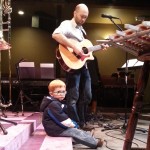This quote is attributed to Augustine, and I love it. I love it because it gives value and weight to the act of singing – that singing is not just some unnecessary ornamental thing. I love it because it reminds me that our songs are more than just songs; they’re prayers.
Too often we think of prayer simply as a one-way monologue from us to God, where we lay all our complaints / wants / needs / thanks in relatively rapid succession, say amen, and move on. Singing helps us slow down our prayers, helps us to listen as part of our praying, and helps us experience prayer in a physical manner.
And the physicality of singing-as-prayer is one way that we live out the Apostle Paul’s encouragement to “offer our bodies” in worship (Romans 12:1-2). You cannot sing un-physically. The few voice lessons I’ve had have revealed to me just how much of my body is (or at least – should be) involved when I’m singing. From my head, to my diaphragm and everything in between – singing is inherently physical.
And somehow, in the mix of melody, rhythm, and text; my mind, our bodies, our emotions, and our imaginations become engaged in worship in ways that simply speaking the words could not accomplish. This strikes me as the gift God has given us in music: this intersection of so many aspects of who we as are as humans.
Scripture itself, though we often tend to think of it as chiefly spoken (or read) word, is filled with poetry and song. I once led a Bible study of 6 high-school guys, and on our way through the book of Judges (every high-school boy’s favorite book of the bible, by the way… read it, you’ll understand why), we came upon Deborah’s song. So instead of reading it that week, we took turns singing it. The melody didn’t matter, it just had to be loud.
So the next time you’re praying before a meal, or reading a Psalm in your devotions; try singing it. See if it doesn’t help you “offer your body” as an act of worship.
Mark Mohrlang
